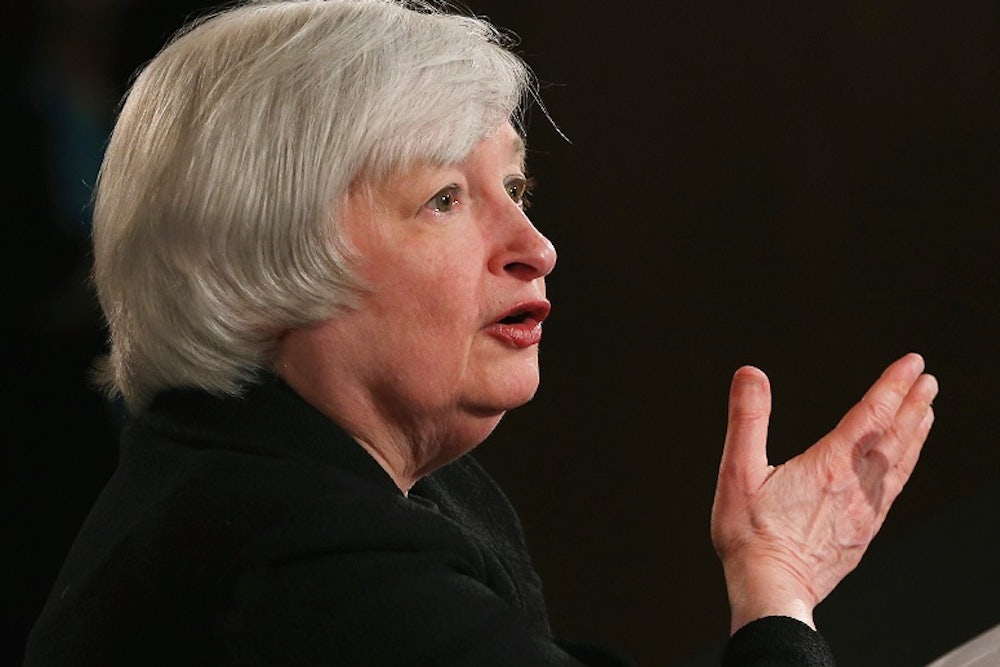On Wednesday, the Federal Reserve released the minutes of its September meeting. Sounds boring, right? It’s not. Or, at least, it shouldn’t be. With gridlock preventing Congress from passing any legislation, the Fed is the only institution looking out for American workers.
Right now, the Fed is weighing when to raise interest rates. It’s a hugely important decision, because raising rates will slow economic growth. Sometimes that’s necessary, in order to avoid inflation. This is not one of those times. Inflation is low, real wages are still stagnant and inflation expectations—that is, what investors expect inflation to be over the next few years—are restrained. Those are three very good reasons to keep interest rates at zero.
Not everyone agrees with that analysis, however. For years, a group of economists and financial analysts has been arguing that the Fed should act, because an inflationary surge is imminent. That hasn’t happened, but these hawks aren’t rethinking their beliefs. Two of them sit on the Fed Board: Dallas Fed President Richer Fisher and Philadelphia Fed President Charles Plosser. They keep agitating for higher rates.
This is why Wednesday’s Fed minutes were so important. They gave us a glimpse into what those two and the rest of the Fed Board were saying the last time they met. And the news was good. It turns out that most Fed board members are more concerned with the underlying weakness of the economy than the specter of inflation. In particular, board members were worried about recent economic struggles in foreign countries. “Some participants expressed concern that the persistent shortfall of economic growth and inflation in the euro area could lead to a further appreciation of the dollar and have adverse effects on the U.S. external sector,” the minutes said. “Several participants added that slower economic growth in China or Japan or unanticipated events in the Middle East or Ukraine might pose a similar risk.”
The U.S. economy is subject to all kinds of forces, some of which are beyond the influence of Fed governors. The health of foreign economies, whether Chinese or European, is one of those. But interest rates are something over which the Fed has control. Led by chair Janet Yellen, the Fed seems to be exercising that control in the best way possible: by showing patience. For millions of Americans struggling to get jobs, or making too little in the jobs they have, that’s great news.
—Danny Vinik
News from Wednesday:
EBOLA: Thomas Duncan, the first Ebola patient discovered in the U.S., died in the Texas hospital where he had been receiving treatment since September 28th. Meanwhile, Administration officials announced that the U.S. would begin more aggressive screening at 5 major U.S. airports. Jonathan Cohn can bring you up to speed on the developments—and what to make of them. (QED)
SAME-SEX MARRIAGE: A day after the 9th Circuit Court of Appeals issued a ruling that allowed gay marriage in Idaho and Nevada, Supreme Court Justice Anthony Kennedy granted a temporary hold on the order. He was responding to a request from Idaho’s governor, but the order affects both states. (Niraj Chokshi, Washington Post)
OBAMACARE: The Administration unveiled a new, streamlined healthcare.gov application, announced that end-to-end testing of the system had begun, and promised this year’s open enrollment would go better than last year’s. In (somewhat) related news, Gallup says the percentage of Americans adults without health insurance is holding steady at 13.4 percent, the lowest level it’s ever recorded. (Sarah Kliff, Vox; Jeffrey Young, Huffington Post)
VOTING RIGHTS: The Supreme Court has said North Carolina can eliminate same-day registration and out-of-precinct voting, at least for this election. The order blocks a ruling, by an Appeals Court, that the changes would reduce opportunities for African-Americans to cast their ballots. The Court’s ruling is not a final decision on the merits, however, and it could take up the case formally in the next term. (Josh Gerstein, Politico)
Articles worth reading
And he’s sticking with his story. Rep. Duncan Hunter, Republican from California, says that “At least ten ISIS fighters have been caught coming across the border in Texas.” Danny Vinik checked with the Department of Homeland Security and—surprise—DHS said the claim was not true. Hunter, by the way, insists he is right. (QED)
If it’s Sunday morning, it must be … Jon Stewart? Chuck Todd now occupies the chair that belonged to David Gregory and, before that, Tim Russert. But Stewart, host of the Daily Show, could have had the job instead. According to Gabriel Sherman, the comedian turned down an offer from NBC, despite being offered “virtually ‘anything.’” (New York)
We’re sick of Scandinavia being good at everything, too. But maybe we should all read Cathie Jo Martin and Alexander Hertel-Fernandez’s article about how Sweden fights income inequality. Hint: It’s not the taxes. It’s the spending. (Vox)
Stories we’ll be watching
Ebola.
At QED
Rebecca Leber says scientists think flooding will be a regular part of life on the Eastern Seaboard within 15 years. Thank you global warming! Danny Vinik previews a Supreme Court case pitting labor against employers, and wonders why the Obama Administration is siding with employers. Harold Pollack writes on the tragic, moving story of a young woman in Oregon suffering from terminal cancer. He says that her decision to take her own life, on her own timetable, is a devastating indictment of our health care system—and the way it handles death.
Links complied by Claire Groden and Naomi Shavin
